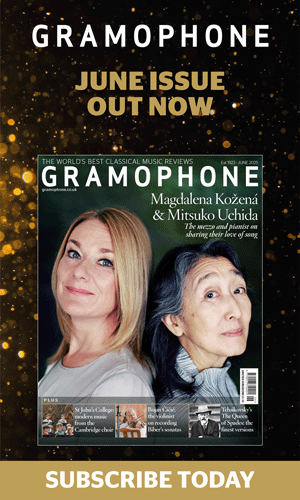My first Gramophone review, by Harriet Smith
James McCarthy
Wednesday, April 10, 2013
I came to Gramophone via a slightly unorthodox route, having worked at the magazine as deputy editor for nearly a decade in the 1990s. I felt as if I was joining a true élite when I was invited back as a reviewer and two things sounded around my head when I said a slightly overawed 'yes'. The first was from the powerhouse who is Quita Chavez, who had run the magazine's historical reviews section (or hystericals, as she had it) after aeons as doyenne of the record industry. She, quite simply, divided the world into 'record men' and 'non-record men' – she still does. I needed to prove myself to be a 'record man'. The other was from Rob Cowan, who once said that you should never write about something unless you had several versions of the piece floating around in your head – comparative reviewing, in other words. It proved to be invaluable advice. Happily, going back to that first disc, of piano trios by Rachmaninov and Shostakovich, I'd still stand by what I wrote, which isn't always the case! Reviewing will always be an intensely subjective matter, but for me it's a constantly illuminating one too.
Rachmaninov Trio elegiaque Shostakovich Piano Trio No 2
Dmitri Makhtin vn Alexander Kniazev vc Boris Berezovsky pf
Warner Classics 2564 61937-2 (79' • DDD) (Buy from Amazon)
Shostakovich – selected comparisons:
Argerich, Kremer, Maisky (10/99) (DG) 459 326-2GH (Buy from Amazon)
Wanderer Trio (6/04) (HARM) HMC90 1825 (Buy from Amazon)
Rachmaninov's only substantial piano trio remains a relative rarity in the catalogue. It's not hard to see why, for this is more of an Ugly Sister than a Cinderella. True, there are many passages of beauty and poignancy, but overall it's an oddly structured piece, with two substantial movements followed by an almost throwaway finale.
This new reading comes closer than most to concealing the work's flaws. The opening movement is wonderfully realised, a single sweep of grief mingled with love and regret (it was written on the death of Tchaikovsky). And the second couldn't be more musically played (just listen to the sparkling interplay from 7'12"). It's a highly piano-centric work, but you never feel that Berezovsky is hogging the limelight, superbly matched as he is by his compatriots. By contrast, the finale, despite its portentous, Brahmsian opening, is over all too soon, as if Rachmaninov simply ran out of steam.
It's tantalising that Rachmaninov left no recording of his own. But in the case of Shostakovich's Second Trio, we have had the composer at the keyboard on two occasions (various labels). Comparison is salutary: most modern interpretations seem sluggish by comparison (though admittedly Shostakovich plays fast and loose with his own tempo indications), particularly in the finale. David Fanning found much to praise in a new version from the Wanderer Trio. To my mind, Berezovsky, Makhtin and Kniazev are even more satisfying; I prefer their slightly faster tempo for the Allegro con brio second movement, while their take on the following Passacaglia ideally balances profundity with unaffectedness. Their restraint is much more potent than the tacky exaggerations of Argerich, Kremer and Maisky, in a live performance from 1998.
Only a couple of niggles: like the Wanderer Trio, the string players apparently ignore the con sordino instruction in the finale (at 7'09"), and in the Passacaglia, at 1'54", there's a very prominent exhalation from one of them bothersome enough to make one wonder why it was left in. The recording is warm and convincingly balanced and complements the superb performances.
Harriet Smith (Gramophone, April 2005)








